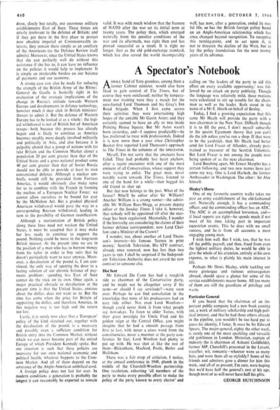A Spectator's Notebook
Myself, I'm not sorry that the amateurs have failed. They had probably lost heart anyhow, after a recent encounter with one of the most eminent of all Conservatives, whose support they were trying to enlist. The great man, never notably warm towards The Times, listened to one of the band for a while—then begged his old friend to shut up.
But that now belongs to the past. What of the future? Who'll be editor after Sir William? Another William is a strong runner—the admir- able Mr William Rees-Mogg, at present deputy editor of the Sunday Times. I take it, however, that nobody will be appointed till after the mar- riage has been regularised. Meanwhile, I wonder if the hierarchy are considering the claims of their former defence correspondent, now Lord Chal- font and a Minister of the Crown?
I wonder, too, about another of Lord Thom- son's interests—his famous 'licence to print money,' Scottish Television. His STY contract, already once renewed, now has less than two years to run. I shall be surprised if the Independ- ent Television Authority does not award the new contract to someone else.
Hot Seat Mr Edward Du Cann has had a roughish ride as chairman of the Conservative party, and he might not be altogether sorry if his term—or should I say servitude?—were soon over. Perhaps he can find consolation in the knowledge that none of his predecessors had an easy ride either. Not even Lord Woolton- though you'd never think it from what people say nowadays. To listen to older Tories, with their great nostalgia for Uncle Fred and his golden reign at the Central Office, you might imagine that he had a smooth passage from first to last, with never a cross word from the constituencies, never a murmur at the party con- ference. In fact, Lord Woolton had plenty to put up with. He was shot at like the rest of them—Blakenham, Macleod, Poole, Butler and Hailsham. - There was a fair crop of criticism, I notice, at the annual conference in 1948, plumb in the middle of the Churchill-Woolton partnership. One resolution, exhorting 'all members of the party to make every possible effort to make the policy of the party known to every elector' and calling on 'the leaders of the party to aid this effort on every available opportunity,' was fol- lowed by an attack on party publicity. Though the language was relatively mild, these motions were calculated to stir up trouble for the chair- man as well as the leader. Both stood in the name of a Mr E. Heath on behalf of Bexley.
Today, I find a growing expectation that this same Mr Heath will provide the party with a new chairman in the New Year. Difficult though it is to fill the post, I don't myself subscribe to the quaint Egremont theory that you can't do the job unless you've run a shop. If that were to be the yardstick, then Mr Heath had better send for Lord Fraser of Allander, already part- trained as treasurer of the Scottish Unionists. But Lord Fraser is not among the people now being spoken of as the next chairman.
Lord Beeching apart, Mr Ernest Marples has a certain following, and two new names have just come my way. One is Lord Harlech, the former Ambassador in Washington. The other : Sir Alec himself.
Healey's Horse One of my favourite country walks takes me past an army establishment of the old-fashioned sort. Naturally enough, it has a commanding officer, and the commanding officer has an ADC. The ADC is an accomplished horseman, and— if local reports are right—he spends much if not most of his time taking part in important equestrian events. This he does with no small success, and he is from all accounts a most engaging young man.
I wish him well. But I wish, too, that he was off the public payroll, and then, freed from even the lightest military duties, he would be able to give the whole of his attention, entirely at his own expense, to what is plainly his main interest in life.
Perhaps Mr Denis Healey, while tackling our more grotesque and ruinous extravagances abroad, should spare a glance for some of the service establishments nearer home. All too many of them are still the guardians of privilege and waste.
Particular General If you heard that the chairman of an im- portant public company had a new book coming out, a work of military scholarship and high poli- tical interest, and that he had three others already in the pipeline, you wouldn't be too hard put to guess his identity, I fancy. It must be Sir Edward Spears. The major-general, eighty the other week, is surely one of the most sparkling and versatile old gentlemen in London. Historian, captain of industry (he is chairman of Ashanti Goldfields), former MP, Churchill's proconsul in the Levant, traveller, wit, romantic—whoever wore so many hats, and wore them all so stylishly? Some of his friends and admirers gave a dinner for him this week, and all of us present, I'm sure, were hoping that we'd have half the general's zest at his age, though most of us will never have half his gifts.
GEORGE HUTCHINSON


































 Previous page
Previous page